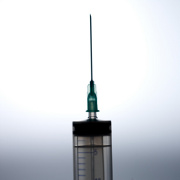 Photo: Getty Images
Photo: Getty Images
With so much conflicting information written on the topic of immunizations, it can be hard to get a handle on it all. When the question of reactions to vaccines arises, often things fly directly to one of two extreme positions. Either reactions are not a concern or, every child is at risk with every needle.
Many parents are concerned, and don't know what to believe. Immunization reactions don't take every child to death's door but adverse reactions do happen. What are they? How serious can they get? What options are open to you as a parent?
The Mayo Clinic cautioned that it's possible to have reactions to any vaccine. Most are mild, like fever, or soreness, redness and swelling in the injection area. The recipient may have no appetite. Dizziness, fatigue and headaches may occur.
Allergic reactions or neurological problems such as seizures are more serious. Children with a history of allergic reactions to medications or foods may be at risk for these reactions.
Children with known allergies should not have vaccines containing those allergens. If your child or a sibling has had a serious reaction, that vaccine should be avoided. If your child has had allergic reactions or reacted adversely to a vaccination, let your doctor know before any vaccine is administered.
In December 2009, the Centers for Disease Control and Prevention stated that in 50 million doses, they saw 204 life-threatening reactions, major disabilities, hospitalization, abnormal birth conditions or death. Thirteen people died, 10 contracted Guillain-Barré syndrome, and 19 developed anaphylaxis.
Webmd.com described serious reactions as being:
• "anaphylaxis or severe allergic reaction in persons who are allergic to any vaccine components (ingredients)
• "development of temporary arthritis following rubella vaccine
• "development of a disease similar to the disease that the vaccine is intended to prevent if a 'live-attenuated vaccine' (see below) is given to a person with a weakened immune system"
Be sure to read the package inserts for any vaccine. Your health care provider is required to make information sheets available to you.
Live-attenuated vaccine contains a living bacteria or virus, previously weakened in a lab. It's supposed to be weak enough not to cause the disease in someone with a healthy immune system.
But this may not be safe for someone whose immune system is weakened. Measles, Mumps and Rubella Virus Vaccine, Live is a live-attenuated vaccine.
An inactivated vaccine is believed to be safe for weakened immune systems but additional doses known as boosters may be needed. The Poliovirus Vaccine, Inactivated is an example.
Those with weakened or incompetent immune systems, who are sick or have had allergic or other reactions in the past, should not have live vaccines.
Webmd.com advised against the meningococcal vaccine if the recipient has had any life-threatening allergic reaction in the past to a meningococcal vaccine or to any vaccine ingredient, or if Guillain-Barré has ever been a diagnosis. If the recipient is ill, rescheduling of the vaccine is advised.
Meningococcal vaccines can cause mild reactions like those mentioned earlier. More serious effects can occur within minutes or hours of vaccination.
Watch for breathing problems, dizziness, hives, paleness, rapid heartbeat, weakness or wheezing. Guillain-Barré syndrome has developed in some people after a meningococcal vaccine. If a serious reaction occurs, see a doctor immediately.
Emedicinehealth.com cautioned, "Adverse reactions and other problems related to vaccines should be reported to the Vaccine Adverse Event Reporting System (VAERS), which is maintained by FDA and the Centers for Disease Control and Prevention (CDC). For a copy of the vaccine reporting form, call 1-800-822-7967, or report online VAERS."
Resources:
Frequently Asked Questions About Immunizations
http://kidshealth.org/parent/general/body/fact_myth_immunizations.html#
Flu vaccine
http://www.emedicinehealth.com/flu_vaccine/page6_em.htm
Childhood vaccines: Tough questions, straight answers
http://www.mayoclinic.com/health/vaccines/CC00014/NSECTIONGROUP=2
The Meningitis Vaccines: What Parents Should Know
http://children.webmd.com/vaccines/meningitis-vaccine-what-parents-should-know
Reviewed June 13, 2011
Edited by Alison Stanton
Visit Jody's website and blog at http://www.ncubator.ca and http://ncubator.ca/blogger





Add a CommentComments
There are no comments yet. Be the first one and get the conversation started!